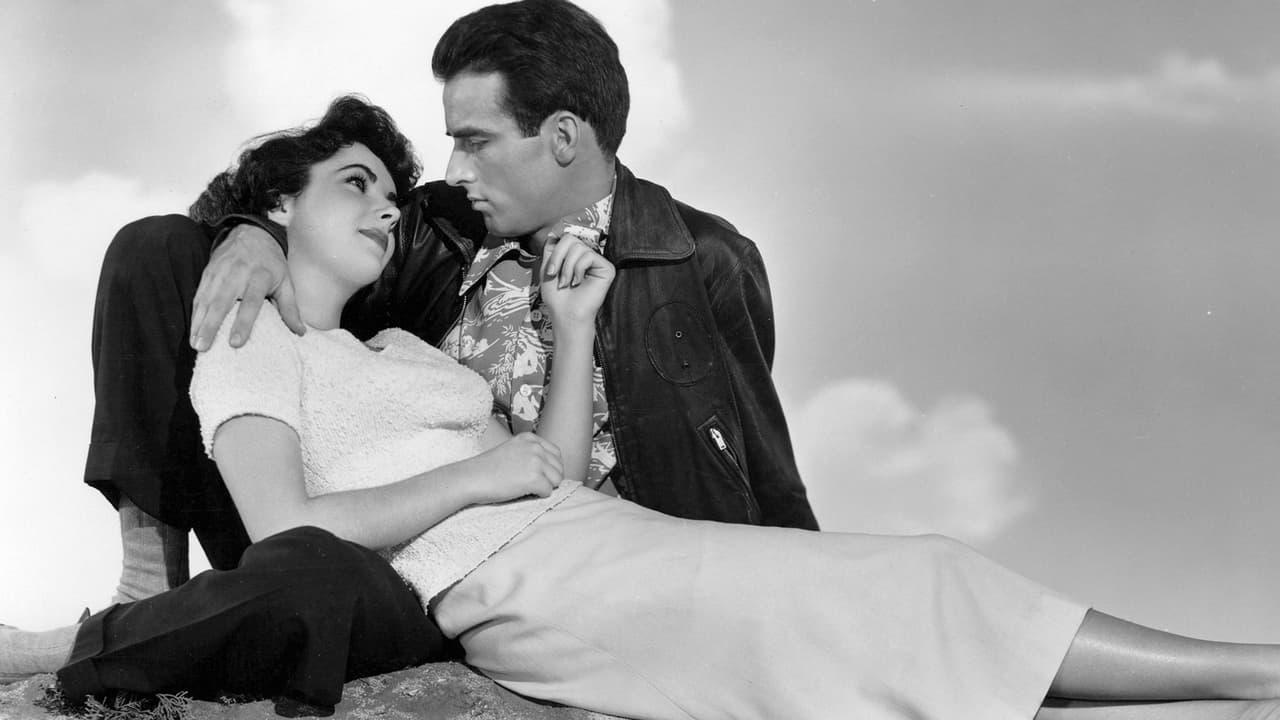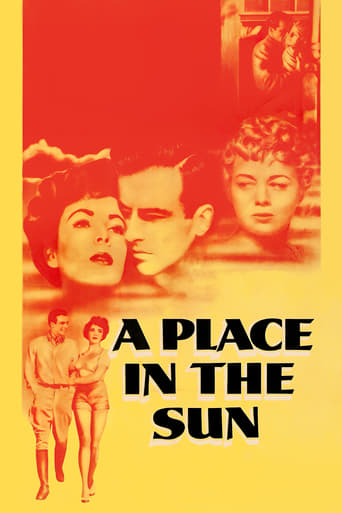

Tied for the best movie I have ever seen
... View MoreSelf-important, over-dramatic, uninspired.
... View MoreGreat story, amazing characters, superb action, enthralling cinematography. Yes, this is something I am glad I spent money on.
... View MoreGreat example of an old-fashioned, pure-at-heart escapist event movie that doesn't pretend to be anything that it's not and has boat loads of fun being its own ludicrous self.
... View MoreThe Plot. The young and poor George Eastman (Montgomery Clift) leaves his religious mother and Chicago and arrives in California expecting to find a better job in the business of his wealthy uncle Charles Eastman. His cousin Earl Eastman advises him that there are many women in the factory and the basic rule is that he must not hang around with any of them. George meets the worker of the assembly line, Alice Tripp, in the movie theater and they date. Meanwhile, the outcast George is promoted and he meets the gorgeous Angela Vickers at a party thrown at his uncle's house. Angela introduces him to the local high society and they fall in love with each other. However, Alice is pregnant and she wants to get married with George. Whatever. Blah Blah Blah. The fact is this movie doesn't hold up. The only reason it's considered a classic is because it's essentially about abortion and the tragic nature of not allowing it. Yes, in other words PROPAGANDA for the left.It's way over dramatic, it plods along thick as pea soup and the acting really isn't all that grand.
... View MoreFor starters - I had always thought that actor Montgomery Clift was just another empty-headed, Hollywood "pretty-boy", and, basically, nothing more than that. But his portrayal in A Place In The Sun (APITS, for short) proved to me, beyond a shadow of a doubt, that he was really quite a gifted performer.In my opinion, it was definitely Clift's heartfelt portrayal as the tragic George Eastman character who gave APITS's story of social snobbery and murder its depth and its meaning. I'd say that it was Clift, alone, who carried this film over its many flaws and clichés to its riveting, melodramatic conclusion.Yes. Of course, it certainly did help APITS's overall success that the gorgeous, 19-year-old Elizabeth Taylor was cast as Angela Vickers, the sole focus of George's hopes, his dreams and his burning desire.Once poor George became hopelessly involved with pretty, young Angela, this viewer could easily understand what heady and emotional turmoil drove him at first to contemplate and then commit the ultimate "crime of passion".If you ask me, I think that even today, 65 years later, this depiction of the "American Tragedy" holds up surprisingly well. It's a film that has somehow managed to avoid that inevitable "dated" feeling which seems to plague so many pictures from that particular era.
... View MoreIt was a shame when it was announced the British actress, one of the last remaining actresses from the "golden age" of cinema, had died, I was certainly looking forward to seeing her young and beautiful in this film, listed in the book 1001 Movies You Must See Before You Die, from Oscar winning, and Golden Globe nominated director George Stevens (Swing Time, Gunga Din, Shane). Basically poor young man George Eastman (Oscar and Golden Globe nominated Montgomery Clift) arrives in a Chicago town, and while working in a hotel as a bellboy has a chance encounter with his wealthy industrialist uncle Charles Eastman (Herbert Heyes), he allows his nephew to visit whenever he is around, and despite the other Eastman family members seeing him as a bit on an outsider George is given a job in Charles's factory. George hopes to impress his uncle working hard, and while there he also starts dating poor and inexperienced fellow worker Alice Tripp (Golden Globe nominated Shelley Winters), she is dazed by him and doesn't really realise his family name being significant, and he does go up the corporate ladder, which include him allowed to suggest improvements to production, and his uncle impressed invites him to the family home for a social gathering. Since he arrived in town, George has been admired by "society girl" Angela Vickers (Dame Elizabeth Taylor), they finally meet at the party, and quickly fall in love, and escorting her propels him into the intoxicating and carefree high society lifestyle he had always been denied, and he stays with her even after Alice announces she is pregnant and expecting him to marry her, he even arranges an abortion which she does not go ahead with. George and Angela go to Loon Lake to seclude themselves and spend time together, he hears a tale of how a drowning occurred and a man's body was ever found, so he concocts a plan to get rid of Alice so he marry Angela, Alice meanwhile threatens to expose him and the pregnancy he caused while at a business event, so he leaves the family so he can deal with the situation. The next morning George and Alice try to get married at City Hall, but it is closed due to Labor Day, so he suggests they spend the day rowing on the lake, she has no suspicions of his plan, he acts visibly nervous before getting the boat, on the water Alice talks about dreams she has had of them being happy together with the child, he changes his mind about any murder plan, but she realises something is wrong, and standing up causes the boat to capsize, and she drowns while he swims to shore. Returning the Vickers lodge he is feeling tense and does not speak to anyone about what has happened, Alice's body is discovered in the water, her death is suspected as murder due to witness statements and abundant evidence, George is arrested just as he is granted permission to marry Angela by her father, although the drowning was accidental George's actions before and after the death condemn him. The District Attorney R. Frank Marlowe (Raymond Burr) acting as prosecution really grills him, and his denials are useless, in the end he is found guilty and sentenced to execution in the electric chair, George confesses he deserves it, as he wanted to kill her, so that makes just as guilty as much as if he had actually committed the crime. Also starring Anne Revere as Hannah Eastman, Keefe Brasselle as Earl Eastman, Lois Chartrand as Marsha, Fred Clark as Bellows, Shepperd Strudwick as Anthony 'Tony' Vickers and Frieda Inescort as Mrs. Ann Vickers. Clift as the young man rising in society, falling in love but brought back down again by an accident is really good, Winters is brilliant as the innocent and sympathetic other woman the leading man formerly had a relationship but unknowingly gets in his way, and young Taylor of course with lovely eyes, dark hair and big lips has never looked more beautiful, and is likable being the glamorous love interest. I don't know the origin of the film title, but the story is based on a novel called An American Tragedy, this is called one of the finest dramatic films of the 1950's, and that is definitely a suitable recommendations, it has impeccable imagery for a black and white picture, the acting and writing is great, I agree it may seem a little dated with it's love story ideas and being a little too drawn out, but it undoubtedly a gripping and splendid classic drama. It won the Oscars for Best Writing, Screenplay, Best Cinematography, Best Costume Design, Best Film Editing and Best Music for Franz Waxman, and it was nominated for Best Picture, and it won the Golden Globe for Best Motion Picture - Drama, and it was nominated for Best Cinematography. Dame Elizabeth Taylor was number 77 on The 100 Greatest Movie Stars, she was number 73 on The 100 Greatest Pop Culture Icon, she was number 7 on Britain's Finest Actresses, she was number 11 on The 50 Greatest British Actresses, she was number 13 on The 100 Greatest Sex Symbols, and she was number 7 on 100 Years, 100 Stars - Women, the film was number 92 on 100 Years, 100 Movies, and it was number 53 on 100 Years, 100 Passions. Very good!
... View MoreA PLACE IN THE SUN starts off as a social drama but turns into a courtroom thriller towards the end. A poor and uneducated young man (MONTGOMERY CLIFT) takes up a menial job in his uncles company. over there, he falls in love with a homely and nagging coworker (SHELLY WINTERS). But the young man slowly rises up in the firm and becomes romantically involved with a rich high flying socialite (ELIZABETH TAYLOR). His ordinary girlfriend becomes a burden and he would do anything to throw her out of his life.I am not a big fan of CLIFT but i'm not surprised that people like De Niro and Pacino look up to him. CLIFT reigns himself in through most of the film. But he sprinkles his understated performance with short outbursts (like the one during the scene in the boat with WINTERS). SHELLY WINTERS is initially desirable as the working class woman who later turns into a nag. ELIZABETH TAYLOR looked gorgeous. I guess she did not have to act much.There is some foreshadowing and foregrounding in the film which sort of underscores its theme of determinism. The beautiful outdoor visuals convey the opulent and idyllic lifestyles of the rich. The directors endeavor to make the film a thrilling courtroom drama towards the end does take away the opportunity to reflect on the actions of the main character. The courtroom scenes do leave a bit to be desired. Some of it was unremarkable while one of the actors who played the prosecuting lawyer was too over the top.But overall, A PLACE IN THE SUN is a very engaging drama filled with easily identifiable characters. I have not read the novel by THEODORE DRESIER on which the film is based. but this is another film about the emptiness of the American dream. The spiritual poverty of the main character is underlined when the priest tells him that if he thought about committing the crime, then he is guilty.In the end, when the main character walks towards his death, the screen is filled with images of his romantic dreams and longing. It was all so near yet so far. But an individual cannot expect to do the right thing and also fulfill his dreams.Jeez! Why do/did American writers and filmmakers have such a negative view about their culture and civilization?
... View More